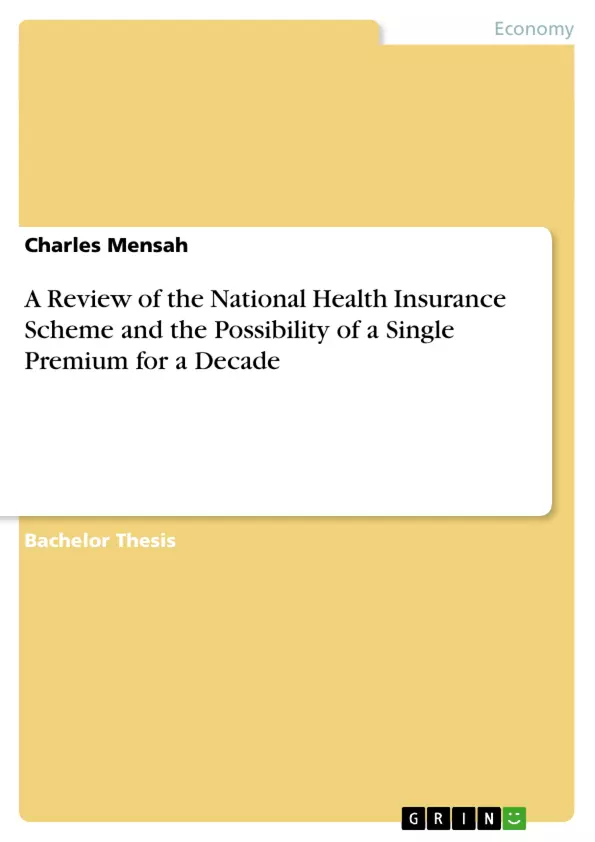The research reviewed the National Health Insurance Scheme and accessed the possibility of a single premium for decade. The whole research had its foundations from the specific objectives which were; to access the possibility of a single premium for a decade that is feasible enough to sustain the scheme, to identify alternative means of generating income to sustain the Kassena- Nankana District Mutual Health Scheme and to assess the perception of registered and potential clients on the NHIS. The research design employed was statistical survey and both qualitative and quantitative data were collected from a sample of fifty respondents. The research study has its justification from the current government’s intention to implement a single premium system for the NHIS. The main hypothesis that “A single premium is feasible to improve healthcare in Ghana” was accepted with some few actuarial assumptions being made. The research findings emphasized the inclusion of age distribution as key variable to avoid all ages paying the same premium. Problem like moral hazards was addressed in this study and advocacy was suggested as a way of curbing it down. The administrative and accounting systems of NHIS must be fully computerized to help reduce the stress of working manually. Advocacy was also suggested as a solution to the problem of clients going for medications for non registered clients with their NHIS card. Keywords; Insurance, Single premium, Health Inurance, Premium.
Inhaltsverzeichnis (Table of Contents)
- CHAPTER ONE
- 1.0 Background
- 1.1 The history of the Kassena-Nankana District Mutual Health Insurance Scheme
- 1.2 Problem Statement
- 1.3 General objectives
- 1.4 Justification
- 1.5 Hypothesis
- 1.6 Scope and expected outcome
- CHAPTER TWO
- 2.0 INTRODUCTION
- 2.1 Insurance
- 2.2 Critiques of the NHIS
- 2.3 MEANS OF GENERATING INCOME TO SUSTAIN A SCHEME
- 2.4 Chapter summary
- CHAPTER THREE
- 3.0 RESEARCH METHODOLOGIES
- 3.1 The research design
- 3.2 Qualitative data technique
- 3.3 Quantitative data technique
- 3.4 The population of the study
- 3.5 The Sample Size of the Study
- 3.6 Data collection techniques
- 3.7 Chapter summary
- CHAPTER FOUR
- 4.0 RESEARCH FINDINGS, ANALYSIS AND DISCURSIONS
- 4.1 Background of the respondents
- 4.2 Membership profile
- 4.3 Designing a model for the single premium calculation
- 4.4 The sufficiency of the net single premium to provide for the claim
- 4.5 The probability that the net single premium will cover the claim (feasibility)
- 4.6 Chapter summary
- CHAPTER FIVE
- 5.0 Introduction
- 5.1 Summary of findings
- 5.2 Recommendations
- 5.3 Chapter Summary
Zielsetzung und Themenschwerpunkte (Objectives and Key Themes)
This research examines the National Health Insurance Scheme (NHIS) in Ghana, particularly focusing on the feasibility of a single premium system for a decade. The study uses the Kassena-Nankana District Mutual Health Insurance Scheme as a case study.- The feasibility of implementing a single premium system for a decade to sustain the NHIS.
- Alternative income generation methods to sustain the Kassena-Nankana District Mutual Health Scheme.
- The perception of registered and potential clients towards the NHIS.
- The impact of age distribution on premium calculation.
- Addressing issues like moral hazards within the system.
Zusammenfassung der Kapitel (Chapter Summaries)
- Chapter One provides background information on the Kassena-Nankana District Mutual Health Insurance Scheme, outlines the research problem, objectives, justification, hypothesis, and scope.
- Chapter Two defines insurance and critically examines the NHIS. It explores potential income generation strategies to sustain health insurance schemes.
- Chapter Three outlines the research methodologies used in the study, including the research design, data collection techniques, and sampling methods.
- Chapter Four presents the research findings, analysis, and discussions. It examines the demographics of the respondents, membership profiles, and explores the design of a model for single premium calculation. The chapter also analyzes the sufficiency of the net single premium to cover claims and the probability of its feasibility.
- Chapter Five summarizes the research findings, provides recommendations for improving the NHIS, and concludes the study.
Schlüsselwörter (Keywords)
The primary keywords and focus topics of this research include insurance, single premium, health insurance, and premium. The research also delves into aspects of the NHIS, alternative income generation methods, client perceptions, and the importance of age distribution in premium calculations. This study is valuable for understanding the feasibility of a single premium system and its potential impact on healthcare in Ghana.Frequently Asked Questions
Is a single premium system feasible for Ghana's NHIS?
The research concludes that a single premium system for a decade is feasible to improve healthcare, provided certain actuarial assumptions are met and age distribution is considered.
Why is age distribution important for health insurance premiums?
Including age distribution as a variable avoids the unfairness of all ages paying the same premium, reflecting different health risks and needs across life stages.
What are "moral hazards" in the context of the NHIS?
Moral hazard refers to situations where individuals use healthcare services excessively or share their insurance cards with unregistered persons because they don't bear the full cost.
How can the NHIS improve its administrative efficiency?
The study recommends fully computerizing the administrative and accounting systems to reduce manual stress and improve data management.
What district was used as a case study for this research?
The research focused on the Kassena-Nankana District Mutual Health Insurance Scheme in Ghana.
- Citation du texte
- Charles Mensah (Auteur), 2010, A Review of the National Health Insurance Scheme and the Possibility of a Single Premium for a Decade, Munich, GRIN Verlag, https://www.grin.com/document/214793



